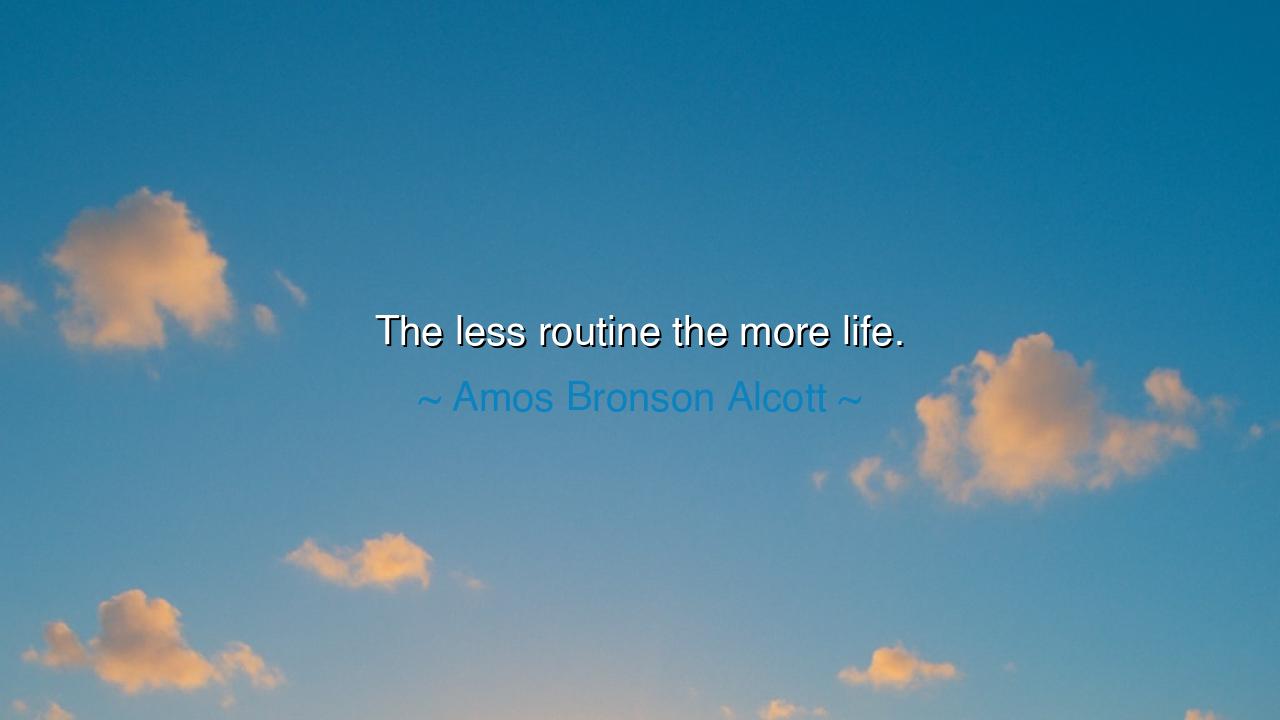
The less routine the more life.






When Amos Bronson Alcott, the philosopher and visionary of New England, declared, “The less routine, the more life,” he was not simply rejecting habit — he was awakening the human spirit to its divine capacity for renewal. In his brief yet luminous words lies a truth as old as time: that life, when imprisoned by repetition, withers into numbness, and that vitality — true, radiant life — is found in freshness, spontaneity, and growth. Alcott, the father of the transcendental movement’s most idealistic dreams, believed that the soul was meant to rise each day like the sun, ever-changing, ever-reaching, never bound by the dull chains of yesterday’s motions.
The origin of this quote is rooted in Alcott’s lifelong pursuit of spiritual and intellectual freedom. Born in the early years of the nineteenth century, he was a teacher, reformer, and thinker whose faith in human potential bordered on the sacred. Alongside his contemporaries — Emerson, Thoreau, and Margaret Fuller — he sought to free the mind from mechanical living, to awaken in every person a creative consciousness that would mirror the beauty of nature itself. For Alcott, routine was not merely the structure of daily life; it was a kind of spiritual sleep. To live without awareness, he believed, was to exist without truly living.
In saying “The less routine, the more life,” Alcott was calling for a rebellion of the spirit — not against duty, but against deadness. He did not condemn work, for he was no idle dreamer; rather, he warned against the automation of the soul, that quiet erosion of wonder that comes when men perform the same acts day after day without reflection or joy. A life bound entirely by routine may appear orderly, but inwardly it decays. The river that ceases to flow becomes a swamp; the mind that ceases to question becomes a cage. To live fully, Alcott taught, one must embrace the unexpected, the mysterious, and the ever-new rhythm of being.
Consider the life of Henry David Thoreau, Alcott’s friend and fellow seeker. Thoreau, weary of society’s machinery, withdrew to Walden Pond to live deliberately — to break the monotony of the world and rediscover the pulse of nature. He sought to strip life to its essentials and found, in simplicity and solitude, the vividness that routine had stolen. “I went to the woods,” he wrote, “because I wished to live deliberately, to front only the essential facts of life.” In escaping routine, Thoreau did not flee responsibility; he found a deeper one — the duty to truly awaken. His experiment became a living testament to Alcott’s vision: that to step outside the predictable is to rediscover the sacredness of each moment.
And yet, Alcott’s wisdom does not demand chaos. Routine has its place — it can steady the hand and sharpen the mind — but when it becomes the master rather than the servant, it suffocates. What he called for was not the absence of structure, but the presence of awareness. Each day, even the most ordinary, contains the potential for revelation if approached with open eyes. To walk the same road but see it anew, to speak the same words but mean them more deeply — this, too, is to escape the tyranny of repetition. The less routine there is in our hearts — that is, the less blindness, indifference, and mechanical living — the more life we shall find, even in the smallest acts.
We see this principle echoed throughout history in those who dared to step beyond the ordinary. The inventors who changed the world, the poets who gave language to the ineffable, the reformers who challenged tradition — all were guided by the conviction that life’s fullness lies beyond convention. Leonardo da Vinci, restless in mind and spirit, refused to confine himself to one craft or science. His insatiable curiosity made him painter, anatomist, engineer, and philosopher in one. For him, every day was an experiment in seeing — a breaking of habit, a celebration of the unknown. His life embodied Alcott’s truth: that when we cease to live by rote, we begin to live by wonder.
The lesson, then, is clear: do not let routine consume the flame of your soul. Order and habit have their place, but they must never silence curiosity or dull the edge of joy. Rise each morning with a question, not an assumption. Seek one new sight, one new thought, one new act of kindness each day. Let life surprise you. For as Alcott reminds us, to live is not merely to repeat, but to create — to breathe new meaning into each moment, and to keep the soul awake to the divine mystery unfolding within and around us.
So, my child, remember this wisdom of the ancients made new through Alcott’s words: “The less routine, the more life.” Do not sleepwalk through your days. Break the pattern now and then — walk a different path, speak to a stranger, listen to silence, or learn something that humbles you. For every act that disrupts the ordinary opens a door to the extraordinary. And when you look back upon your years, you will find that the moments when you stepped beyond routine were the moments when you were truly alive.






AAdministratorAdministrator
Welcome, honored guests. Please leave a comment, we will respond soon